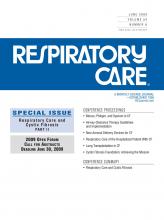Abstract
Although some clinicians still believe that cystic fibrosis (CF) lung disease is largely due to hypersecretion of very viscous mucus, it has never been demonstrated that there is mucus hypersecretion in CF and it is clear that there is almost no intact mucin (the principal polymeric component of normal mucus) in CF sputum. CF sputum has lower viscosity when compared to asthma or bronchitis sputa, but is highly tenacious and biochemically most closely resembles pus. Tenacity and lower viscosity lead to decreased cough clearance of infected phlegm, which is thought to induce a persistent inflammatory state in the airway, leading to bronchiectasis. There are many medications and devices either in use or under development that are meant to improve airway hygiene in CF by assisting with sputum expectoration. This paper discusses the scientific basis and potential mechanism of action for many of these interventions and briefly reviews the clinical evidence of their safety and effectiveness.
Footnotes
- Correspondence: Bruce K Rubin MEngr MD MBA FAARC, Department of Pediatrics, Wake Forest University School of Medicine, Medical Center Boulevard, Winston-Salem NC 27157-1081. E-mail: brubin{at}wfubmc.edu.
Dr Rubin presented a version of this paper at the 43rd Respiratory Care Journal Conference, “Respiratory Care and Cystic Fibrosis,” held September 26-28, 2008, in Scottsdale, Arizona.
- Copyright © 2009 by Daedalus Enterprises Inc.







